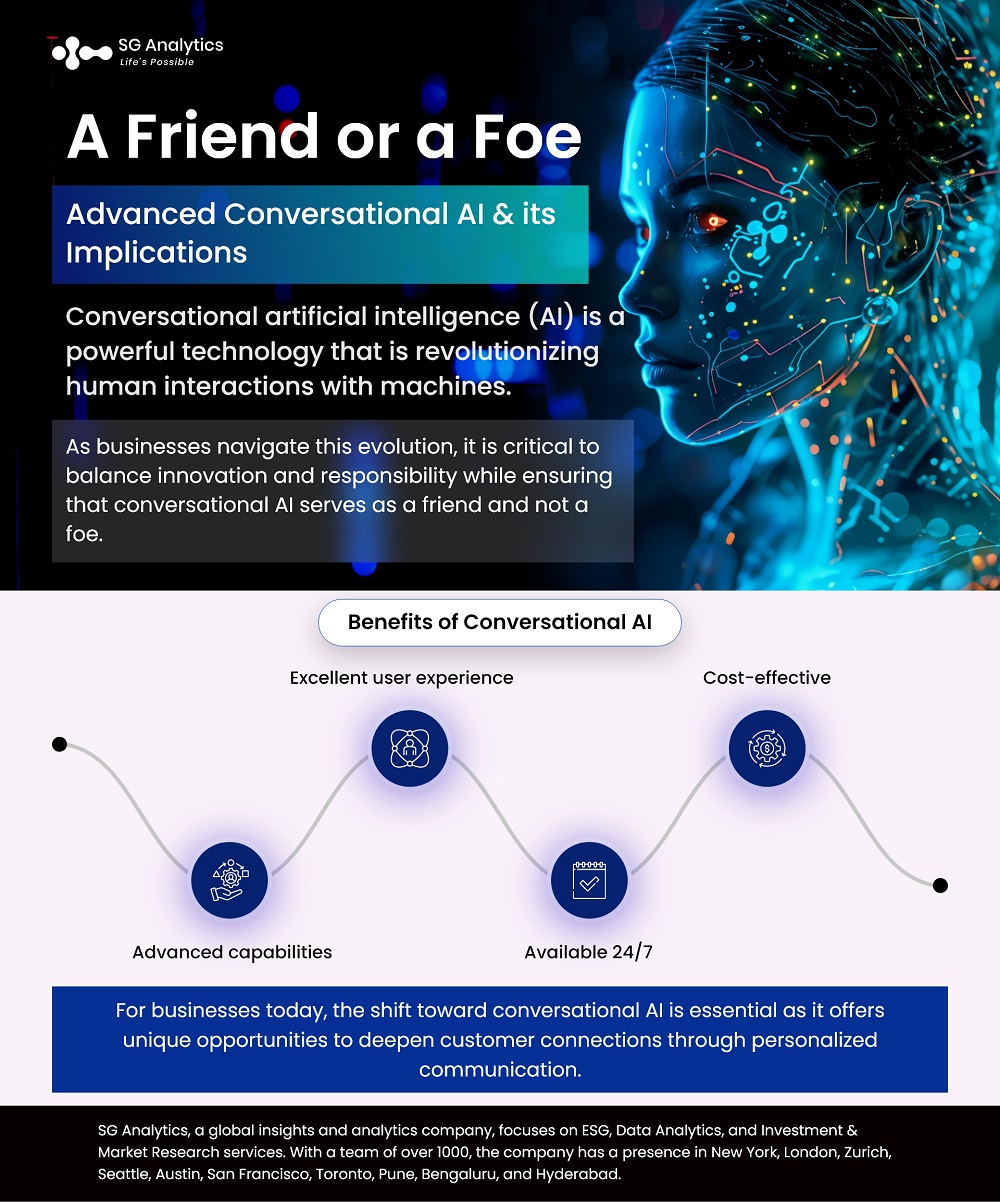Conversational artificial intelligence (AI) is a powerful technology that is revolutionizing human interactions with machines. Tech has given birth to virtual assistants and chatbots, making our lives more convenient and efficient. However, it also raises complex ethical, technological, and societal challenges.
Conversational AI looks promising as it offers immense potential for positive impact, but it also poses significant challenges.
As businesses navigate this evolution, it is critical to balance innovation and responsibility while ensuring that conversational AI serves as a friend and not a foe. Organizations can harness conversational AI's true transformative power and enhance human well-being by prioritizing ethical considerations, encouraging research, and promoting inclusive development. Although the road ahead is filled with complexities, the future of conversational AI holds immense potential as a catalyst for positive transformation.
Therefore, it is important to understand whether conversational AI is a friend, a foe, or the future of research.
Read more: Data Monetization: Turning Data Streams into Gold with Analytics
Conversational Artificial Intelligence: A Force for Progress
Conversational AI is momentarily impacting customer experience, enabling businesses to bridge the gap between humans and machines. This sophisticated branch of artificial intelligence is taking customer support to the next level by simulating human-like communication with its problem-solving abilities.
It holds the potential to enhance human-computer interaction and address ethical concerns. With the help of natural language understanding, emotional intelligence, and other technological advancements, conversational AI is becoming more intuitive and effective.
However, as with any emerging technology, there is a maze of data, buzzwords, and misconceptions to navigate. Despite these challenges, conversational AI offers incredible potential. By prioritizing responsible research and development, businesses can tap into conversational AI's potential while minimizing its risks and creating a future where humans and machines can collaborate harmoniously.
Conversational AI can also offer valuable insights into cognitive processes and user preferences. It provides ample opportunities for innovation and research. Furthermore, applied AI values research can help mitigate ethical concerns associated with conversational AI, like bias detection and mitigation and transparent decision-making algorithms.
Read more: Beyond the Foundational: Generative AI Investors Turn to Applications in 2024

Conversational Artificial Intelligence as a Friend
Conversational AI plays the part of a helpful friend in many ways
- improves communication.
- provides personalized assistance.
- makes the exchange of information and access to market services more inclusive and accessible.
- enables seamless interactions between humans and machines.
Some popular examples of virtual assistants include Siri, Alexa, and Google Assistant. They offer hands-free access to different tasks and information. Furthermore, in customer service, conversational AI facilitates 24/7 support, thereby enabling businesses to enhance customer satisfaction and operational efficiency. Its ability to understand and respond to human queries helps boost productivity and convenience.
Conversational AI encompasses a range of artificial intelligence technologies that simulate natural communication between humans and machines.
Benefits of Conversational AI
- Advanced capabilities: Conversational AI can help automate a wide range of customer service interactions by adapting to situations with sophistication.
- Excellent user experience: It offers complex, flexible, and natural conversations, thus equipping businesses to enhance customer experience with human-like interactions.
- Available 24/7: Conversational AI provides round-the-clock customer service, meeting customer expectations for immediate access and assistance.
- Cost-effective: It helps reduce operational costs by handling large volumes of interactions, thereby leading to significant savings and a high ROI.
Conversational Artificial Intelligence as a Foe
While conversational AI has many advantages, it also poses some severe challenges and potential drawbacks. This further raises concerns about ethics, employment, and social dynamics. There are ethical concerns related to privacy, data security, bias, and manipulation. Collecting and using personal data for training AI models demands strict regulations to protect user privacy and prevent data misuse. Additionally, there is a growing concern about the displacement of human jobs, especially in customer service and administrative roles, as conversational AI is becoming more advanced. This also raises broader societal questions about economic disruption and opportunities.
Today, most headlines scream about AI as an existential threat, but is this helpful? AI is undeniably transforming the world, but with that change comes challenges.
Read more: Harnessing the Power of Data for Data-driven Decision-Making and Business Growth

The Potential Pitfalls of Conversational AI
Job displacement: Automation powered by conversational AI is now being perceived as a double-edged sword. While it enhances efficiency, it is also leading to job losses across specific sectors. There is a growing need to address retraining and reskilling initiatives to create a future-proof workforce.
Algorithmic bias: Conversational AI systems are only as good as the data on which they are trained. Biased data can lead to discriminatory results. It is, therefore, critical for businesses to ensure fairness and transparency in AI development.
The weaponization of AI: The use of conversational AI raises serious ethical concerns. Due to these growing concerns, international collaboration is critical to prevent an arms race in this domain.
Relying heavily on conversational AI for social interaction can also lead to a decline in human-to-human communication, thus resulting in social isolation and dependency issues. Hence, while conversational AI offers convenience, its uncontrolled proliferation is likely to worsen societal challenges.
Key Takeaways
- Conversational AI has become a reality that is revolutionizing business operations across industries.
- Conversational AI systems are developing new standards for digital customer service by unlocking its full potential.
- Understanding how conversational AI works, its benefits, and how to manage its limitations will empower businesses to get optimal results from this technology.
Read more: Mirror of Reality: The Rise of Deepfakes and Its Ethical Impact

Final Thoughts
Conversational AI is a spectrum of technologies that simulate natural communication. It uses natural language processing (NLP), natural language understanding (NLU), generative AI (GenAI), and machine learning (ML) to identify, understand, interpret, and respond to human inputs.
Conversational AI is set to emerge as a transformative force in digital interaction in 2024 and beyond. It promises enhanced, human-like interactions across customer service, personal assistance, and beyond, thereby creating a new era of intuitive digital experiences.
As conversational AI becomes more integrated into everyday life, the importance of ethics and privacy in its development cannot be overstated. This involves ensuring that the systems are transparent, secure, and unbiased while also protecting user data and fostering trust. Prioritizing these ethical considerations is critical for maintaining user trust and promoting the responsible use of conversational AI technologies.
For businesses today, the shift toward conversational AI is beneficial and essential. It offers unique opportunities to deepen customer connections through personalized communication. Key trends and insights further help underline the vast potential and growing demand for this technology, highlighting the importance of adopting it.
The time to integrate conversational AI into business strategy is now.
A leading enterprise in Generative AI solutions, SG Analytics focuses on unlocking unparalleled efficiency, customer satisfaction, and innovation for the client with end-to-end AI solutions. Contact us today to harness the immense power of artificial intelligence and set new benchmarks in operational efficiency, customer satisfaction, and revenue generation.
About SG Analytics
SG Analytics (SGA) is an industry-leading global data solutions firm providing data-centric research and contextual analytics services to its clients, including Fortune 500 companies, across BFSI, Technology, Media & Entertainment, and Healthcare sectors. Established in 2007, SG Analytics is a Great Place to Work® (GPTW) certified company with a team of over 1200 employees and a presence across the U.S.A., the UK, Switzerland, Poland, and India.
Apart from being recognized by reputed firms such as Gartner, Everest Group, and ISG, SGA has been featured in the elite Deloitte Technology Fast 50 India 2023 and APAC 2024 High Growth Companies by the Financial Times & Statista.









